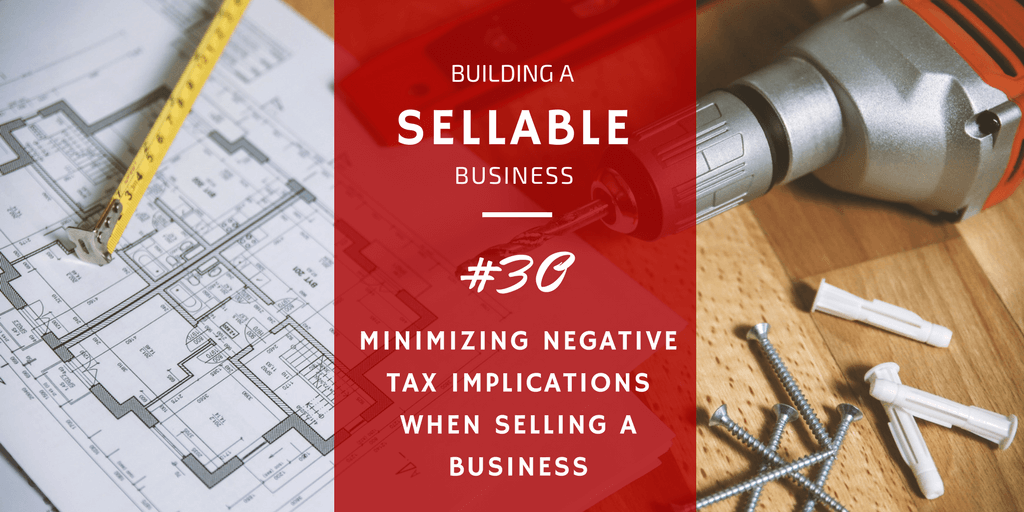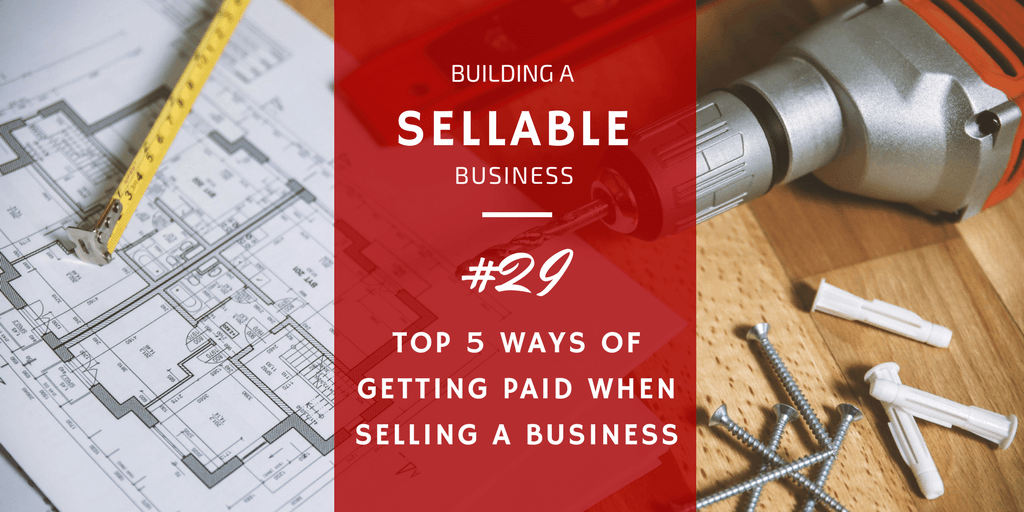
Simple Assumptions Can Lead to Employer-Employee Conflict
April 12, 2018
Minimizing Negative Tax Implications When Selling a Business – Post #30
April 26, 2018Top 5 Ways of Getting Paid When Selling a Business – Post #29

Upon issuance of the Letter of Intent, the formal sale of your business begins. Buyer and seller teams are currently negotiating the terms and details of the purchase agreement. If you’re like me, you’re probably worried about a lot of things at this point, especially money. With all the time, energy, and money you’ve invested into your business over the years and with all the money you’re paying professionals to help you sell your business, how and when do you get paid? Those are legitimate questions, friends. So in this episode, I want to walk you through the top five ways of getting paid when selling a business.
Podcast Time Index for “Ways You’ll Be Paid When Selling Your Business”
00:32 – The ways You’ll Be Paid for Selling Your Business
01:34 – The Big Cheque
02:49 – Stock, ESOP
05:32 – Stock, maintain stock in the company/Buyer’s company
08:03 – Earn-Out
12:31 – Promissory Note
18:41 – Employment
22:37 – Recap
The Most Common Ways of Getting Paid When Selling a Business
#1 – Cash
The first way to sell your business is to sell it for cash. Most likely, this is the way you expect to get paid when you sell your company.
Isn’t cash king? Doesn’t everyone like it? Of course we do; we love cash. We’ve built and grown our companies over years and years, and now we want that big, four-foot cardboard check presented to us, right? I sold one of three businesses on a cash basis, and I felt like I had won the lottery! It was an outstanding experience.
So if you’re offered cash for your business, you can essentially “take the money and run.” It’s the easiest type of sales transaction, and it’s the least risky one, too.
However, many times buyers do not want to outsource that much cash, so they’ll come up with other creative ways to fund, or buy, the business. Plus, sellers may not want to pay taxes on the capital gains they receive from the sale of their business. Thus, they look for other buy-out options.
#2 – Stocks
Secondly, buyers and sellers can use one of two types of stock buy-out methods to get paid upon the sale of the business. For these stock methods to work, you must operate as a C Corporation or an S Corporation (technically an LLC taxed as a C or S is also allowed) that can buy, sell, and trade company stock. Remember our discussion about business operations and entities? This is where your chosen entity can affect your future sellability. If you’re not sure which business entity to choose or you’re not sure how your business operations affect your sellability, go back to that post.
An Employee Stock Ownership Plan (ESOP)
To get paid through an ESOP, you must hire an independent evaluator to place a value on your company’s stock. Once the value is determined, you hire a trustee to set up and operate an independent trust. At that point, the trust buys stock shares from you based on the purchase price the evaluator set. Employees, then, have the option to purchase company stock from the trust, which will hold the stock as long as the employee works for the company. When an employee leaves or retires, he can sell the stock back to the trust at a fair market value.
While the ESOP can get very complicated, it has a lot of advantages. Essentially, this is a way an owner can remain with the company while taking the capital out of the company. If you don’t want to retire in the immediate future, you can set up an ESOP. Then, you continue to run the organization until you’re fully paid or have sold all of your stock shares.
Another good thing about an ESOP is that it benefits and rewards long-term employees. The ESOP creates a long-term initiative and loyalty program that rewards employee commitment and hard work. It incentivizes employees to drive your company towards success because they own portions of it. The more valuable your stocks become, the more money they get when they sell!
An ESOP is not for every corporation, though. Some entrepreneurs don’t like having a third party evaluate company shares. Many feel that the valuation is lower than what they would receive for their stocks on the open market.
Another disadvantage of the ESOP is that the company has to have cash. You have to keep a fair amount of cash on hand so that when an employee leaves, you can convert their stocks to cash and pay-out that particular person’s shares.
Stock Buy-Outs
This second method of stock buy-outs can also get complicated, so I’ll try to make it as simple as possible. To generate additional capital or to retire from your business, you can sell company stocks. As in an ESOP, you want to hire an independent valuator to place a value on those stocks. Buyers can then purchase the majority of your shares, all of your shares, or portions of them. In doing so, they become shareholders/owners in your company and have rights to elect directors and vote on company policies. However, you have the option to keep some of the company’s stock. Thus, you can maintain some control of the business AND receive immediate cash capital.
Let’s assume the buying company or the majority shareholders drive the business to unprecedented success. Consequently, your shares increase in value, making you lots and lots of money. With hopes this will happen, you want to add a provision into the stock sale agreement that allows you to buy additional shares at set terms, such as at the price the shares were valued upon the sale of your business.
However, what if the purchasing company drives your company into the ground? What if the value of your stocks plummets? You must have provisions written into the sales agreement which allows you to purchase additional shares at the same value majority owners can or sell them to other owners at a predetermined set price.
Another provision you want to address in stock buy-outs is a tag-along right. In other words, if buyers purchase the majority of your company shares for $10 and then find a buyer to pay $20 for them, make sure you can include your shares in that deal. You want to “tag-along” on that sale and get that $20 per share.
Lastly, make sure you address piggyback rights in a stock buy-out. If the buying entity makes its shares public, you want the right to publicly register your shares, too. You want the right to “piggyback” on their success.
#3 – EarnOut
I found the best definition of an earnout from Investopedia. The author explains that “an earnout is a contractual provision stating that the seller of a business is to obtain additional compensation in the future if the business achieves certain financial goals, which are usually stated as a percentage of gross sales or earnings.” Essentially, this allows the buyer to give you a fair price for your company now but gives you the bonus you think it’s worth later on if the business does well. Let’s break that down.
Say your company has $5,000,000 in sales and $500,000 in earnings. A buyer wants to pay $2,500,000 for the company, but you think that’s too low. You personally believe the company will drastically increase in sales because of some groundwork you have laid. For both parties to agree, you enter into an earnout, or a compromise. In this example, the buyer pays the 2.5 million dollars up front as a deposit on the business. Then, he agrees to give you the additional 2.5 million IF the company reaches $10,000,000 in sales over a three year period. If the company doesn’t reach a certain amount of sales, the buyer doesn’t have to pay you any additional money. Or, you can add in a provision that he will owe you “x” more dollars at the end of three years regardless of growth.
Using the same $5,000,000 and $500,000 from our example, let’s say the seller pays you $2,500,000 up front. Instead of asking for an additional $2,5000,000 IF the company reaches a certain amount of sales, you ask for a guaranteed 5% of the company’s gross sales over the next three years. Then, if the business makes $10,000,000 in three years, you get an additional $500,000 per year for the 3-year term. If the business makes $20,000,000, you earn another million per year of the 3-year earnout term.
An earnout can offer the seller a handsome reward. It can also leave you with nothing other than the down payment. A buyer could put a novice in charge of your business who drives it into the ground. In three years, you get nothing else because the company closed or earned no profit. Similarly, the buyer could have purchased your company to get rid of his competition. If he absorbs your company into his or drives all your business to the sister company, then you get nothing other than the down payment. So be wary, and protect yourself. Know your buyer’s intentions before you choose the earnout option.
#4 – Seller-Carried Note
A great option for buyers, Owner Financing may not be the best option for sellers.
Different than an earnout, you and the buyer agree on the company’s worth. However, the buyer cannot or will not come up with the cash to cover the entire purchase price. The buyer will usually pay 65% – 80% of the company’s value, but he will ask the seller to carry a promissory note for the remaining 20%-35%. In this case, then, the buyer expects the seller to carry some of the risks with him.
If you’re going to do a seller-carry, take a few factors into consideration.
Is your company well seasoned? In other words, is it strong enough to withstand transitions within the market? Is your product or your service adaptable if technology advances or economic market crashes? You may have jumped into a market fad. Maybe your company is one of 20 bakeries in a small town. You know, because of economic circumstance, the majority of those bakeries will close their doors. If you doubt the future longevity of your company for any reason, then you may want to choose a different buy-out option.
Additionally, you must trust the buyer enough to carry a note. What happens if the buyer liquidates company assets or spends all the company cash? Can you trust him enough to make consistent, long-term payments to you? Essentially, you’re leaving your greatest asset and all the company’s assets at risk in a buyer’s hands. Talk with your legal team. If you agree to carry a note for the buyer, make sure you protect yourself within the sales agreement.
#5 – Offer of Employment
In this last option, the buyer may offer you employment as part of the buy-out. If you’d like to sell but aren’t ready to stop working, this option might work for you. Or, if the buyer wants to purchase your company but doesn’t know enough about your industry, he may ask you to remain in the company for a set amount of time to teach him how to operate the business. In my years as an exit planner, I’ve seen the offer of employment buy-out work really well, and I’ve seen it work really poorly.
Sometimes, sellers stay to fulfill an employment contract and get frustrated. Usually, this happens when there’s a significant age difference. Other times, buyers and sellers may encounter personality conflicts. Remember, sellers have poured years of blood, sweat, and tears into this business. They have made it their “own.” If a buyer comes in and starts making all kinds of changes to the seller’s “baby,” his actions could create resentment, angst, and animosity in his relationship with the seller.
If buyers and sellers recognize that conflict can arise in this buy-out option, they can build protective provisions into the employment contract.
For instance, if a buyer offers you employment and intends to become the President or the CEO of the company, you might ask that you report to him, not to a middleman. Also make sure that the buyer spells-out your specific role, your job description, and your work location. Lay everything on the table. The last thing you want to do is go from being the CEO of the company in Tennessee to cleaning toilets at a company located in Kansas (unless you like lots of farmland).
Nail down any “what-ifs” you can think of before your term of employment begins. What if you get fed up? Is there a fall-back provision where you pay back some money, or do you get to leave and just give up some unearned compensation? What if the buyer gets tired of you? Does he terminate you with pay? Without pay?
Outline everything. Determine your salary. Decide whether or not to place a salary cap on the buyer during your term of employment. Understand the fringe benefits. Whatever you and the buyer do, seek legal advice to prepare for best and worst-case scenarios.
Review
So, friends, those are the top 5 ways of getting paid when selling your business. Buyers can pay you in cash. You can also sell through stock options or earnouts. If you trust the buyer, maybe you carry a promissory note or enter into an employment agreement for a set amount of time. You never know what the sale looks like until you get there, so at least know your options. Utilize one pay-out or a combination of pay-outs. Every business sale is different. Rely on your professional advisors, and jump right in!
In the next article, we will be discussing tax implications… specifically who pays the taxes when a business sells and how to minimize them. Spoiler alert – as with so much of a business sale, your professional advisors will be instrumental in keeping yours as low as possible.




